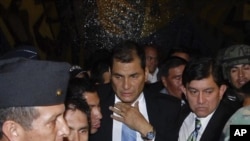Ecuador's government is moving ahead with an investigation into what it claims was an attempted coup by dissident police officers against President Rafael Correa last week. Analysts say both the president and police bear some responsibility for the standoff.
Ecuadorian investigators gathered at a Quito hospital to reconstruct the events that led President Rafael Correa to accuse police and opposition leaders of a failed coup.
Mr. Correa was taken to the police hospital after being hit by tear gas during a protest by police officers on Thursday. He later said dissident officers confined him in his room for several hours, prompting military soldiers to storm the building and free him. Five people were dead following the operation, and scores more were injured.
For Ecuadorians, there are many unanswered questions about what happened between Mr. Correa and police that day. But analysts say questions are growing about whether the events amounted to a coup.
Andres Ochoa is a researcher with the Latin American Center for Political Studies in Quito:
"There are some investigations right now, finger-pointing at the police mainly," said Ochoa. "The government came out strong saying there were political actors behind it, but they have not named a single name yet. The figure of the coup d'etat as they portrayed it is slowly eroding."
Opposition politicians have rejected claims they took part in any plan to remove the president from office. They also point out the military remained loyal to the president, and no political rivals stepped forward to claim his post.
The conflict between Mr. Correa and police was sparked by reforms aimed at cutting bonuses and other benefits for police and military personnel. Officials had agreed to raise wages for security forces this year to balance out the cuts, but now lawmakers say they may revise the austerity measure altogether because of the response from police officers.
University of Texas at Austin political scientist Raul Madrid says Mr. Correa has sparred with other state employees over similar reform proposals. But the clash with police turned into something bigger.
"Correa is a hard-liner in many respects, and when he makes up his mind about something, he will push it very hard," said Madrid. "I think for a lot of presidents, the police would be the last people you would want to offend. But Correa is not like that."
Since taking office in 2007, Mr. Correa's leadership style has helped him win broad support in the Andean nation. He has fought for indigenous people's rights, halted foreign debt payments and rejected a new lease for a U.S. military air base for anti-drug operations.
Raul Madrid says Thursday's events may further burnish Mr. Correa's image as someone willing to challenge powerful interests.
"So I think he might emerge strengthened from all this," he said. "Of course a lot of people argue it was a big mistake for him to negotiate directly with the police himself. But to other people it looks tough, he comes off looking like a tough guy."
The president's critics say he bears some responsibility for Thursday's events, because he chose to confront police officers during a street protest. They say too often he takes an aggressive stance with opposition groups, and has repeatedly threatened to dissolve Congress.
Andres Ochoa of the Latin American Center for Political Studies says the public may pressure Mr. Correa to reconsider his leadership style in the wake of the clash. He says, without the president's intervention on Thursday, the police protests may have been a small event.
"It would have another minor news story in the Ecuadorian news cycle and it would not have been the dramatic scenes that took place Thursday night," he said.
President Correa has vowed to find those responsible for the violence last week. Friday, the chief of the national police force resigned because of the incident.
Ecuador Advances Probe into Alleged Coup




